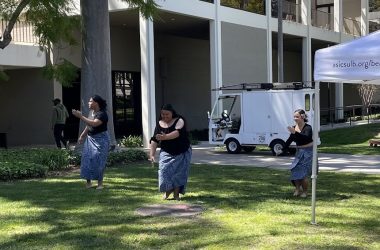Cal State Long Beach students living on campus must receive or prove receipt of meningococcal vaccination before they can enroll in classes next semester.
Meningococcal is the bacterium that causes meningitis.
The $90 vaccine, previously only recommended to students living on campus, is now mandatory. For those who didn’t meet the Oct. 31 deadline, a hold will appear on their accounts, meaning they will not be able to sign up for courses until they receive clearance from CSULB Student Health Services.
Stan Olin, director of Housing and Residential Life, said the adoption of the mandatory vaccination was an administrative decision that would benefit the safety of students. He feels it is important “for the protection of the students.”
Kandi Dubrall, a licensed vocational nurse from Student Health Services, said the mandatory measure is something that has long been recommended by the Center for Disease Control.
The meningococcal vaccination is voluntary at surrounding university campuses like Cal State Fullerton, Cal State Dominguez Hills and UCLA. Louisiana and New York are the only states that require the meningococcal vaccination.
According to Olin, one reason for enforcing the measure was a set of meningitis reports in 2007.
In March, a student living in the Los Alamitos residence hall was infected with bacterial meningitis and another case was reported in the Los Cerritos residence hall in April.
Last week, the Los Angeles County Department of Public Health gave CSULB’s health center 280 vaccines, which were available to students for free the next day at Student Health Services.
Dubrall said the Los Angeles health department had meningitis vaccines that were getting close to their expiration date and decided to donate those doses to several places, including CSULB. She called it a “fluke” and said it came at the perfect time for students.
Dr. Michael Carbudo, director of the Health Center, said they received 280 surplus vaccines that were set to expire Nov. 7. Forty five went unused.
Olin said the deadline for the meningococcal vaccination, originally scheduled for Sept. 30, was extended to Oct. 31.
For some students, missing the deadline was an issue of not being able to provide proof of vaccination.
Ashley Olgado, a senior journalism major, was vaccinated but lost the records proving she had already received the necessary shot. Olgado said she received an e-mail warning she would have a hold on her account if she did not get vaccinated.
“I didn’t get an e-mail until the 31st [the day of the deadline],” Olgado said.
Olgado ended up having to skip class and wait in line for a second shot because she didn’t want to miss the free vaccination window.
Though Olgado was concerned getting a second shot might be hazardous to her health, she was reassured that getting revaccinated was not dangerous.
One student reported experiencing adverse reactions to her first vaccination. Rachel Welch, a junior journalism major, broke out into hives within hours of her shot. Though students were required to wait about 20 minutes after getting the shot to make sure allergic reactions didn’t occur, Welch waited the 20 minutes, but “I didn’t have [a reaction] in the first 20 minutes.”
By 1 a.m. that night she began to get hives on her legs, which were gone by the time she woke up. She got to class later that morning and started to break out in hives all over her body.
“I had hives everyday for a week.” Welch said.
Welch went to Student Health Services, and they had her take steroids for seven days, but they told her that, “It’s really rare to have a reaction.”
“I’m the only one [I know] who got a reaction,” Welch said.
Candace Catterall, a freshman international studies major and marketing major, got her first vaccination prior to coming to CSULB. Catterall said she did not have any adverse side effects but said the experience was unpleasant.
“[The shot] hurt really bad. I was in excruciating pain for two days,” Catterall said.
Dubrall said students living in closed quarters such as dorms are at a higher risk.
Meningococcal is a rare but highly contagious infection that can be either bacterial or viral and causes an inflammation of the membranes surrounding the brain.
According to Dubrall, it causes flu-like symptoms and the bacterial infection can lead to death if left untreated.
Anthony Vasquez contributed to this report




There’s no need to make such a big deal out of it. That vaccine could have saved my brother’s life; as far as I’m concerned the more people get it, especially living in a higher-risk situation like college dorms, the better.
We are become a nation of sheep.
Seems to me your both over reacting a little. Not all students have to get vaccinated, just the ones in the dorms. There is still a choice to live off campus or attend another school. I for one would be grateful to have one less thing to worry about if I was sending my children off to school. The torrent of vaccines mandated on our tiniest and most fragile children truly is an outrage, but this seems to make somewhat more sense.
This is wrong. So now you can’t attend school unless you get some form of vaccine? keept the pharmaceutical companies in business as usual. demanding you do something to your body is unconstitutional
Mandatory vaccinations? Whatever happened to civil liberties? There is no way I would vaccinate myself or my child. No such thing as a safe vaccine=oxymoron.